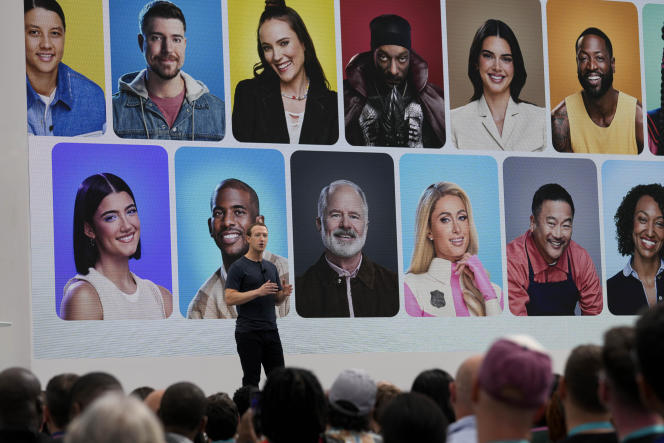What if, at any time, in your conversations on Instagram or WhatsApp, you could ask a question to a ” assistant “ ? Maybe you would ask him for restaurant ideas in a neighborhood, have him do a web search and “to end a controversy between friends”, or even create the image of a liner with sails, to see what such a ship would look like… This is the vision presented by Mark Zuckerberg, Wednesday September 27: the founder of Meta announced the deployment of twenty-eight conversational robots on its Facebook, Instagram, WhatsApp and Messenger platforms. One of them will be general and the others thematic: cooking, combat sports, fashion… Their avatar will be embodied by a personality, from the rapper Snoop Dogg to the fashion influencer Paris Hilton.
Launched in beta version in the United States now, these conversational robots are expected to develop on social networks: Meta wants, in the coming months, to allow developers, brands and influencers to create their own versions.
This enthusiastic presentation is the latest in a new series of announcements made in a few days by digital giants in the field of artificial intelligence (AI). Very active since the successful launch, at the end of 2022, of the conversational robot ChatGPT, its creator OpenAI, and its partner Microsoft, but also their rivals Google, Meta or Amazon continue to engage in an AI race, generating an abundance of launches.
The ancient dream of the universal companion
A common thread emerges: the idea of a virtual personal assistant. AI revives this old dream of the “tech” industry of creating a universal companion capable of helping the user in their daily life, their leisure or their work… The concept recalls the initial ambition of voice assistants like Siri (Apple), Google Assistant or Alexa, created in 2014 by Amazon, with, as a reference, the omniscient computer in the series Star Trek. “The new conversational assistants are Clippy of the 21ste century “, deciphers in a press release Mor Naaman, professor at the American University Cornell Tech, specialist in communication between AI and humans. A reference to the help interface launched by Microsoft in its Office suite in 1996 – embodied by a small paperclip with human features – and then deactivated in 2001 after a flood of mockery and criticism.
Tuesday September 26, Microsoft relaunched a “everyday companion” in Windows 11, the latest version of its environment. Currently available in North America, Asia and South America, this assistant called Copilot uses artificial intelligence from OpenAI, creator of ChatGPT and partner of Microsoft. Accessible by dedicated buttons or in a dialog window, it can summarize a text, explain a point, write a draft or create a video from vacation photos, Microsoft promises. Copilot will also be extended in November to Office software (Word, Outlook, Powerpoint, etc.).
You have 51.78% of this article left to read. The rest is reserved for subscribers.
